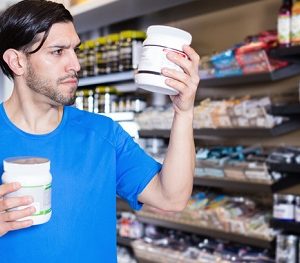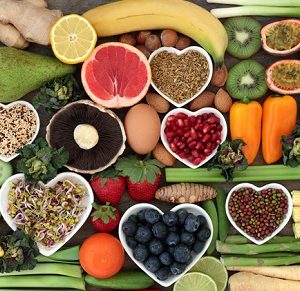Are You at Risk for Vitamin B12 Deficiency?
Did you know that your body can’t produce vitamin B12? Are you getting enough of this essential vitamin in your diet? Many people are not getting enough B12, and a deficiency of this micronutrient can cause serious health problems.
What Does B12 Do in the Body?
Vitamin B12 has several functions in the in the body. First and foremost B12 helps to maintain healthy nerve cells and helps in the production of both DNA and RNA.
Another vital function of this essential vitamin is it supports the production of red blood cells. Haemoglobin is a protein inside of the red blood cells which carries oxygen throughout the body. Red blood cells, made inside in the bone marrow, remove carbon dioxide from the body, taking it to your lungs so it can be expelled.
In a roundabout way, vitamin B12 is also partially responsible for increasing blood iron levels, keeping it in a healthy range. Vitamin B12 works closely with vitamin B9, also called folate or folic acid, to help make red blood cells and to help iron work better in the body.
Due to the fact, your body can’t produce vitamin B12; you need to get it from animal products or supplements. The amount you need will be dependent on age, dietary restrictions, health conditions and medications.
What Causes Vitamin B12 Deficiency?
Vitamin B12 Deficiency can be created by a variety of different situations. These issues arise from problems with the stomach or intestines, certain types of anemia, immune disorders or dietary restrictions.
Vitamin B12 only occurs naturally in foods that are derived from animals. Once ingested the body starts to break down the product in the stomach where it must be combined with a protein in the stomach called intrinsic factor. The broken down product would then be pushed into the small intestine where it is absorbed.
However, there are several circumstances where this process can be interrupted such as:
1) Pernicious anemia, which happens due to several problems; when the stomach lining is weakened (atrophic gastritis), autoimmune conditions that attack the lining of the stomach, or congenital pernicious anemia (which is rare and not diagnosed until after the age of 30). All of these conditions make it difficult for the body to produce the intrinsic factor protein so the body can’t break down or utilize the products you are ingesting that have B12. Pernicious anemia can also be created by certain health conditions like Addison disease, chronic thyroiditis, Graves’ disease, Hyperparathyroidism, Hypopituitarism, Myasthenia gravis, Secondary amenorrhea, Type 1 diabetes, Testicular dysfunction and Vitiligo. It is important to start treatment immediately. Permanent nerve damage can occur if you do not start treatment within six months of the onset of symptoms.
2) Surgery on your digestive system, including any removal of the stomach or small intestine including bariatric for weight loss, can result in vitamin B12 deficiency. The deficiency is because the digestive tract has been modified so that most of the stomach and duodenum have been bypassed. Vitamin B12 need the acidic environment with the intrinsic factor to be broken down and utilized. Subsequent to any major gastric surgery discuss supplement options as B12 injections may be required post-surgery.
3) A disease that affects the small intestine such a Crohn’s and Colitis, Celiac disease, bacteria or parasites that affect the digestive system can also create a B12 deficiency. The shortage of the appropriate proteins would be the premise for the problem just the same as it would for the medical issues already stated.
4) Extended use or overuse of over-the-counter or prescription acid-reducing drugs can cause vitamin B12 deficiency. According to studies on Proton pump inhibitors and risk of vitamin and mineral deficiency: evidence and clinical implications (2), reducing inappropriate prescribing of PPIs can minimize the potential risk of vitamin and mineral deficiencies. Those most at risk for a B12 deficiency with PPIs are the elderly and malnourished patients, as well as those on chronic hemodialysis.
5) Vegan diets are typically a problem because very few plants are a source of B12 and those that have it are B12 analogs. An analog is a substance that blocks the uptake of B12, so the body’s need will increases. For the most part, vegans consume and absorb enough B12 to avoid anemia or nervous system damage, but do not generally get enough to minimize the risk of heart disease.
Discuss appropriate supplementation with your physician, nutritionist or naturopath if you are considering a vegan diet.
6) Vitamin B12 deficiency is estimated to affect 10%-15% of people over the age of 60 according to studies (5). Their issues start when with absorption of protein-bound vitamin B12 is decreased, because of a high prevalence of atrophic gastritis as people age.
Symptoms of B12 Deficiency
Mild deficiencies most likely will cause no symptoms. However, as the levels drop symptoms will increase and can include;
Weakness, tiredness, or light headedness, heart palpitations, shortness of breath, constipation, diarrhea, a loss of appetite, or gas, nerve problems like numbness or tingling, muscle weakness, problems walking, vision loss, depression, memory loss, or behavioral changes.
Treating Vitamin B12 Deficiency
People with pernicious anemia or gastric absorption problems will initially need to replace vitamin B12 by injection and then continue with high doses of sublingual oral replacement therapy. Vegans and elderly should include vitamin B12-fortified grains, high-dose oral supplements or B12 injections.
Intrinsic factor is a glycoprotein released by parietal cells that line the internal surface of your stomach. Without intrinsic factor, your body can only absorb about 1% of the B-12 you ingest. With the help of intrinsic factor, this amount increases to 56% of a one microgram dosage of B-12. However, Intrinsic factor has its limits. If you take dosages of B-12 that exceed the capacity of intrinsic factor – between one and two micrograms – absorption is decreased. (6)
It is important for people to start treatment and resolves the problem before any nerve damage occurs or becomes permanent.
How to Prevent Vitamin B12 Deficiency
The easiest way to prevent vitamin B12 deficiency is by eating adequate quantities of animal products including meat, poultry, fish, dairy and eggs.
In the event, you do not consume animal products or have a condition where you can’t absorb the B12 from food then it is recommended to supplement your diet with a sublingual B12 supplement or see your doctor for B12 injections. Discuss any supplementation with your doctor to ensure there aren’t any contraindications with medications you are taking.
Learn more about nutrition with 110 fundamental sports nutrition principles essential to achieving and maintaining optimum health, performance and longevity. The Principles of Sports Nutrition (PSN) is a 24- hour online Sports Nutrition Course which is perfect for fitness professionals, athletes, health food store retailers, supplement distributors, physical education teachers, coaches, and wellness consultants. It is ideal for all individuals with an interest in anti-aging, dietary analysis, health and fitness management.
Cathie Glennon – BCRPA/SFL
1) https://medlineplus.gov/ency/article/000569.htm
2) https://www.ncbi.nlm.nih.gov/pmc/articles/PMC4110863/
3) https://www.webmd.com/food-recipes/guide/vitamin-b12-deficiency-symptoms-causes
4) https://www.veganhealth.org/articles/everyvegan
5) https://www.ncbi.nlm.nih.gov/pubmed/10448529
6) https://www.livestrong.com/article/466841-vitamin-b12-and-intrinsic-factor/
-
 Sports Supplements 101 Webinar$15.75
Sports Supplements 101 Webinar$15.75 -
 Micronutrients Webinar$15.75
Micronutrients Webinar$15.75

